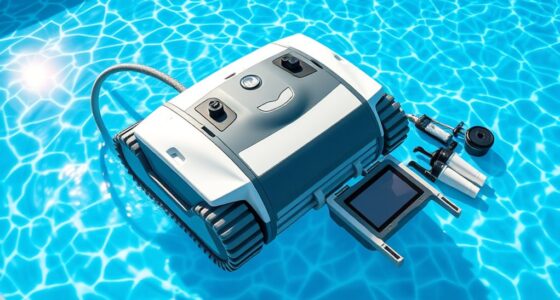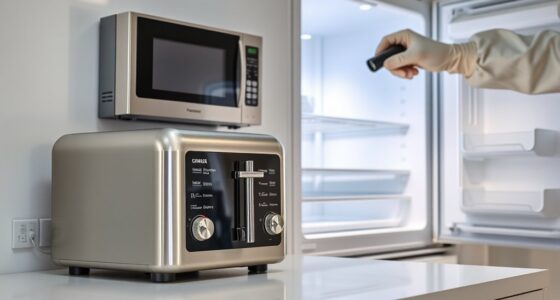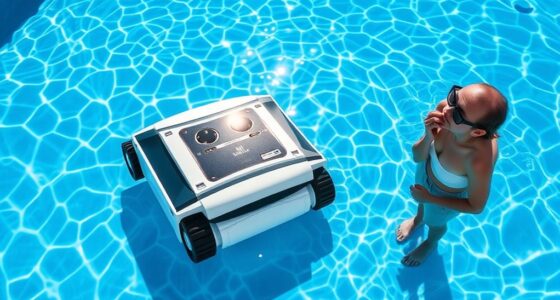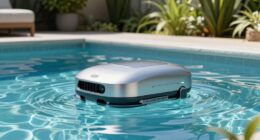Pressure pool cleaners are easy to set up and manage, providing thorough debris removal with strong suction and scrubbing power. They’re energy-efficient, especially models that use less electricity, and tend to be cost-effective over time. However, they may struggle to clean tight corners or hard-to-reach spots, and initial installation can be complex or costly. If you want to know more about maximizing their benefits and avoiding common issues, keep exploring your options.
Key Takeaways
- Pressure pool cleaners offer strong suction and thorough debris removal, especially for larger pools.
- They require proper installation and compatible plumbing systems, which can increase setup complexity.
- These cleaners tend to have higher initial costs but can be more durable and effective long-term.
- Limited agility may cause missed spots or difficulty cleaning tight corners and stairs.
- Operating costs depend on energy use and maintenance needs, with some models benefiting from energy-efficient features.
Ease of Use and Convenience
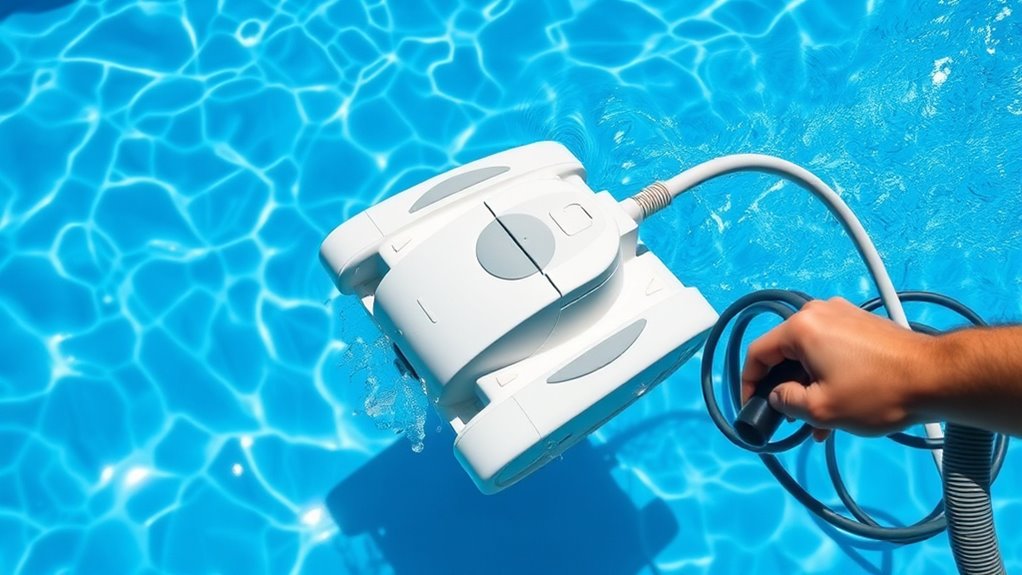
Pressure pool cleaners are designed to make pool maintenance easier, and many users find them straightforward to operate. The user interface is simple, often involving just attaching the hose and turning on the system, which minimizes setup time. These cleaners typically come with clear instructions that help you get started quickly. Additionally, noise levels are generally manageable, so they won’t disrupt your backyard or poolside activities. You won’t need to worry about loud, disruptive sounds while the cleaner is running. This ease of use means you spend less time troubleshooting and more time enjoying your pool. Moreover, some models incorporate automated cleaning functions that further streamline maintenance tasks. The development of robust safety measures in newer models helps prevent potential malfunctions, enhancing user confidence. Plus, the design considerations often include features that facilitate easy maintenance, making it simpler to keep the cleaner in optimal condition. For added convenience, many models are equipped with remote control options, allowing for even easier operation from a distance. Many models also feature intuitive controls, which contribute to a smoother user experience. Overall, pressure pool cleaners offer a convenient, user-friendly experience, making regular maintenance less of a chore.
Effective Cleaning Performance
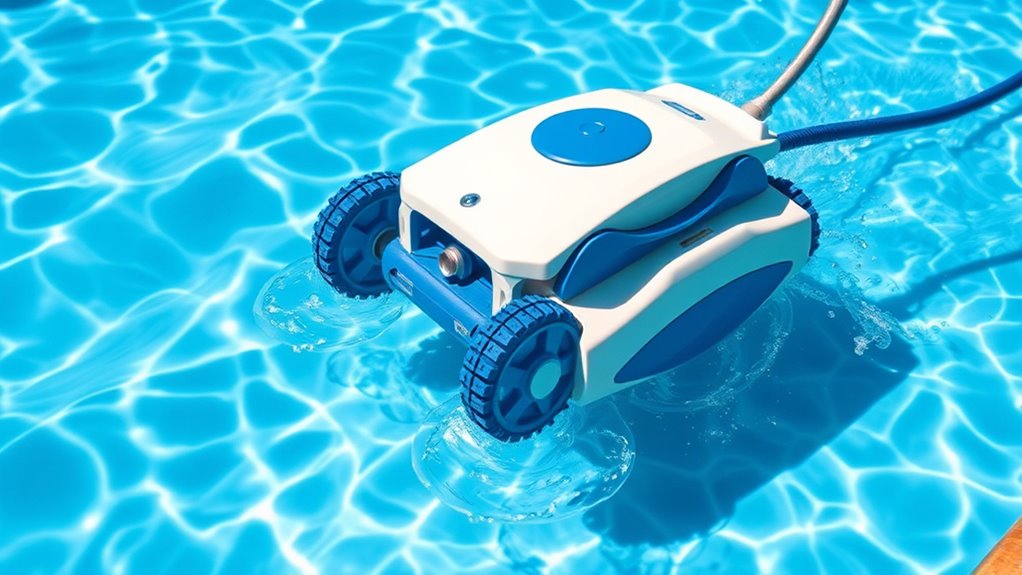
Pressure pool cleaners excel at removing debris thoroughly, leaving your pool sparkling clean. Their consistent scrubbing action guarantees all surfaces are scrubbed evenly, preventing buildup. This reliable performance helps you maintain a pristine pool with less effort. Additionally, their ability to promote cultural narratives through effective cleaning techniques highlights their versatility and importance in pool maintenance. The use of advanced technological features can further enhance their efficiency and longevity, making them a valuable tool for regular upkeep. Proper maintenance of these cleaners can also extend their lifespan, ensuring continued cost-efficiency over time. Moreover, leveraging Volkswagen Tuning principles such as optimizing performance and efficiency can inspire innovative approaches to pool cleaning technology, boosting their overall effectiveness. Incorporating innovative materials in their design can also improve durability and cleaning efficiency, further advancing their performance.
Thorough Debris Removal
When it comes to cleaning your pool thoroughly, pressure pool cleaners excel at picking up debris that other devices might miss. They effectively remove leaves, dirt, and small particles from hard-to-reach corners, ensuring a cleaner pool. To maximize their debris removal, maintaining proper chemical balance is essential, as it prevents algae buildup and keeps debris loose. Additionally, using the right pool accessories, like brushes or vacuums, can complement the cleaner’s performance. Pressure cleaners often have strong suction power, allowing them to lift stubborn debris from the floor and walls. Regularly checking and adjusting your pool’s chemical levels helps prevent debris from sticking or settling, making the cleaner’s job easier. Proper filter maintenance also plays a crucial role in maintaining optimal suction and debris removal efficiency. Moreover, selecting the appropriate pressure cleaner model based on your pool size and shape can significantly improve cleaning results. Ensuring the correct installation of the pressure system can prevent operational issues and enhance cleaning performance. Proper pool circulation is also essential for distributing chemicals evenly and aiding debris removal, which can further improve the overall cleaning process. Additionally, understanding how pressure pool cleaners operate can help you troubleshoot common issues and optimize their use for thorough debris removal. Overall, pressure pool cleaners deliver thorough debris removal when paired with proper pool maintenance.
Consistent Scrubbing Action
While pressure pool cleaners are effective at removing debris, their scrubbing action is what truly guarantees a thorough clean. However, their consistent scrubbing can sometimes be be a drawback. You may need manual operation to adjust cleaning paths or ensure thorough coverage, which can be time-consuming. Relying on chemical treatments alone won’t compensate for areas missed during scrubbing, making it essential to monitor the process. The pressure cleaner’s scrubbing action is powerful but may not reach every nook, especially if the device isn’t properly maintained or positioned. Additionally, proper maintenance ensures the cleaner operates efficiently and extends its lifespan.
Energy Consumption and Operating Costs

You’ll want to contemplate how much power pressure pool cleaners use to operate and how that impacts your energy bills. Maintenance expenses can add up over time, affecting your overall costs. Understanding these factors helps you choose a cleaner that’s both efficient and budget-friendly. Additionally, considering digital literacy can assist in managing and optimizing your pool maintenance routines through smart devices and apps. Being aware of energy-efficient technology can further reduce ongoing operational costs by selecting models that consume less power.
Power Usage Efficiency
Power usage efficiency is a crucial factor to take into account when choosing a pressure pool cleaner, as it directly impacts your operating costs and energy consumption. Some models leverage solar power, reducing reliance on traditional electricity and lowering energy bills. Solar-powered cleaners are especially effective if your pool receives ample sunlight, making them a sustainable choice. Additionally, battery efficiency plays a role in portable models, affecting how long they operate before needing a recharge. High battery efficiency means longer cleaning cycles with less energy loss, saving you money over time. By evaluating these aspects, you can select a cleaner that minimizes energy use while maintaining effective cleaning performance, ultimately reducing your long-term operating costs and environmental footprint.
Maintenance Expenses
Maintenance expenses for pressure pool cleaners mainly stem from their energy consumption and ongoing operating costs. You’ll notice energy bills increase as these cleaners run regularly, especially with high power usage. Additionally, repair frequency impacts your budget—more frequent repairs lead to higher replacement costs over time. Proper maintenance can reduce repair needs, but parts may wear out faster depending on usage. Some models require costly replacements of hoses or motors, adding to your expenses. While pressure cleaners are generally affordable upfront, their long-term costs can add up if repairs are frequent or energy consumption is high. Energy efficiency features in newer models can help reduce operating costs and extend the lifespan of critical components. To keep costs manageable, regular upkeep and choosing energy-efficient models can help minimize both repair costs and energy bills. Maintenance costs can also be affected by the quality of the parts used and the frequency of professional servicing. Furthermore, selecting models with durable components can significantly lower the need for frequent replacements and repairs. Properly maintaining your pressure pool cleaner can also prevent unnecessary wear and tear, further reducing overall expenses. Additionally, understanding the technology advancements in modern cleaners can guide you in making more cost-effective choices.
Compatibility and Installation Considerations
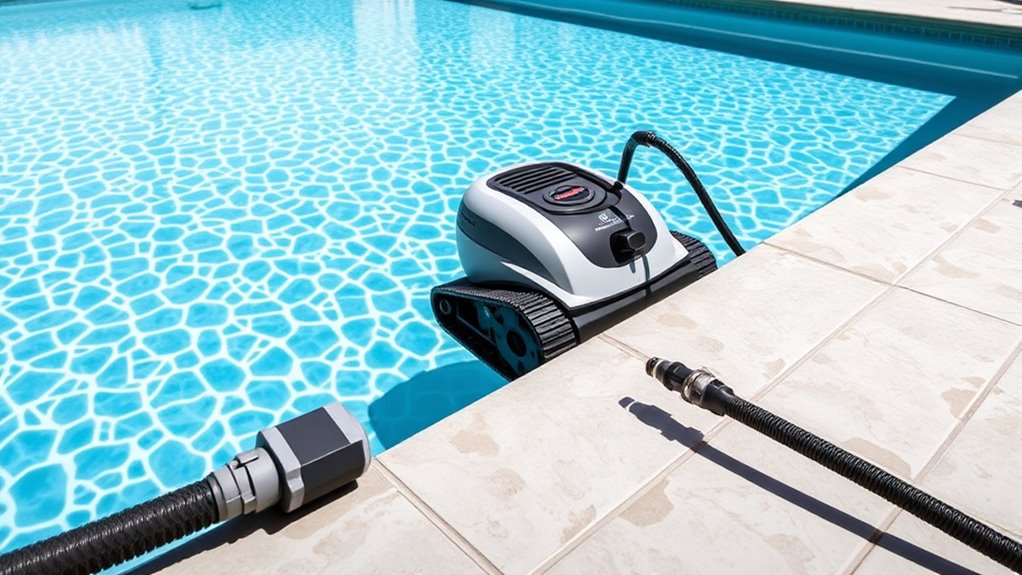
Before choosing a pressure pool cleaner, it’s important to assess its compatibility with your pool’s equipment and setup. Some models require specific fittings or pressure levels, which can lead to compatibility issues if your system isn’t suitable. Installation complexity varies; some cleaners are straightforward to set up, while others demand more effort and technical know-how. You might need to adjust your pool’s plumbing or purchase additional accessories, increasing the overall setup time. If you overlook these considerations, you could face problems like improper operation or damage to your pool’s equipment. Ensuring compatibility and understanding the installation process beforehand helps you avoid surprises and guarantees your cleaner works efficiently right from the start. Additionally, reviewing maintenance requirements can help ensure the cleaner remains effective over time. Being aware of the pressure requirements can also prevent potential damage or inefficiency during operation.
Durability and Maintenance Needs
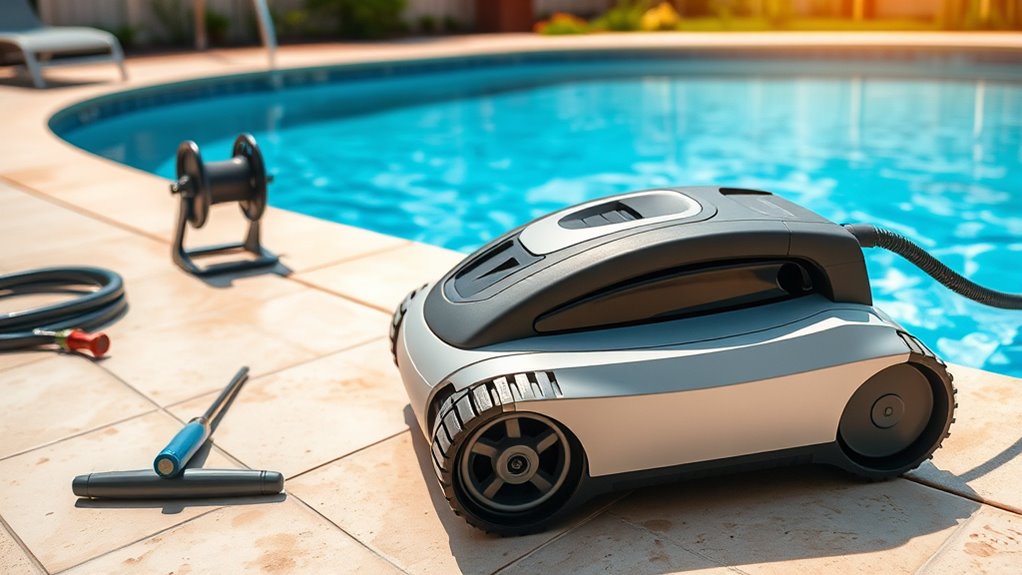
While pressure pool cleaners are generally designed for durability, their lifespan and ongoing upkeep depend heavily on the build quality and how well you care for them. A model with good corrosion resistance will withstand pool chemicals and harsh conditions longer, reducing the need for frequent replacements. Regular maintenance, such as rinsing after use and inspecting hoses and connections, helps prevent unnecessary wear. Keep an eye on moving parts and replace worn-out components promptly to extend the cleaner’s life. Although pressure cleaners are built to last, cheaper models may need replacing sooner, increasing your overall replacement frequency. Proper care guarantees your pressure pool cleaner remains effective and minimizes costs over time.
Limitations and Potential Drawbacks
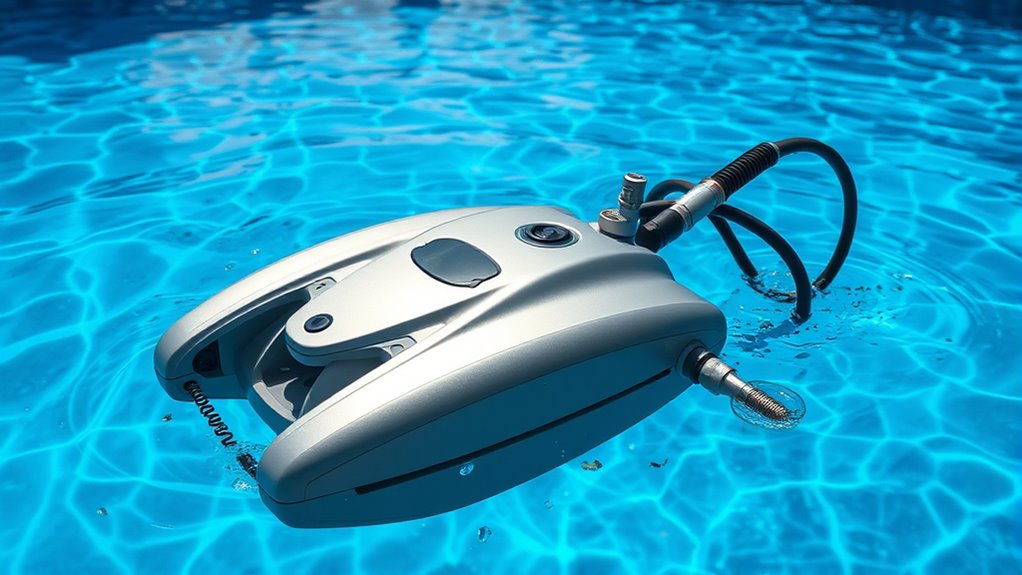
Pressure pool cleaners can be effective, but they do have limitations that you should consider. One major drawback is their limited coverage, which means they might miss certain areas of your pool, especially corners and tight spots. This can lead to uneven cleaning and require you to manually clean those neglected spots. Additionally, pressure cleaners tend to have a high cost upfront, making them a significant investment. They often require specialized parts and maintenance, adding to the overall expense. You should also be aware that these cleaners rely on your pool’s plumbing system, so if there are issues with your equipment, performance might suffer. While they work well for regular cleaning, their limitations could mean you need supplementary cleaning methods for a thorough job.
Frequently Asked Questions
How Long Do Pressure Pool Cleaners Typically Last?
You might wonder how long pressure pool cleaners last. Typically, with proper maintenance tips like regular filter checks and rinsing, they can last around 3 to 5 years. Keep in mind, cost considerations play a role—more durable models might cost more upfront but save money long-term. To extend their lifespan, follow manufacturer guidelines and perform routine upkeep, ensuring you get the most from your investment.
Are Pressure Pool Cleaners Suitable for All Pool Sizes and Shapes?
Did you know that over 80% of pool owners find pressure pool cleaners effective? They’re generally suitable for most pool sizes and shapes, but your specific pool might need adjustments. For larger pools, a more powerful cleaner could be necessary, while irregular shapes may require models with flexible navigation. You should select a cleaner that matches your pool’s size and shape to guarantee thorough cleaning and avoid missing spots.
Do Pressure Pool Cleaners Require Regular Professional Servicing?
Pressure pool cleaners generally don’t need regular professional servicing if you perform routine maintenance yourself. You can handle DIY troubleshooting and minor repairs easily, like checking hoses or cleaning filters. However, occasional expert maintenance can keep your cleaner running smoothly and extend its lifespan. Regularly inspecting and maintaining your pressure cleaner at home helps prevent issues, saving you time and money on repairs and ensuring your pool stays clean and inviting.
Can Pressure Pool Cleaners Operate in Pools With Uneven Surfaces?
Think of your pool as a lively dance floor; pressure pool cleaners are like skilled dancers, but uneven surfaces can trip them up. Their surface adaptability varies, sometimes making it tricky to navigate bumps or slopes. Despite this, they excel at debris handling, sweeping up leaves and dirt with ease. You might need to tweak their settings or manually guide them on rough patches, but overall, they can work quite well on uneven pools.
Are There Safety Concerns When Using Pressure Pool Cleaners?
When using pressure pool cleaners, safety concerns include chemical safety and electrical hazards. You should handle chemicals carefully and store them properly to prevent accidents. Make sure the cleaner’s electrical components are well-maintained and grounded to avoid shocks. Always follow manufacturer instructions, keep the area dry around electrical parts, and unplug the device when not in use. These precautions help guarantee safe operation and protect you from potential hazards.
Conclusion
Choosing a pressure pool cleaner is like selecting the right tool for a job—you need to weigh the pros and cons. I once watched a friend struggle with a stubborn stain until he switched to a pressure cleaner, and the job was done effortlessly. Remember, no single option fits all pools. Consider your needs carefully, just as you’d choose the right key for a lock, and you’ll find the best fit to keep your pool sparkling year-round.


